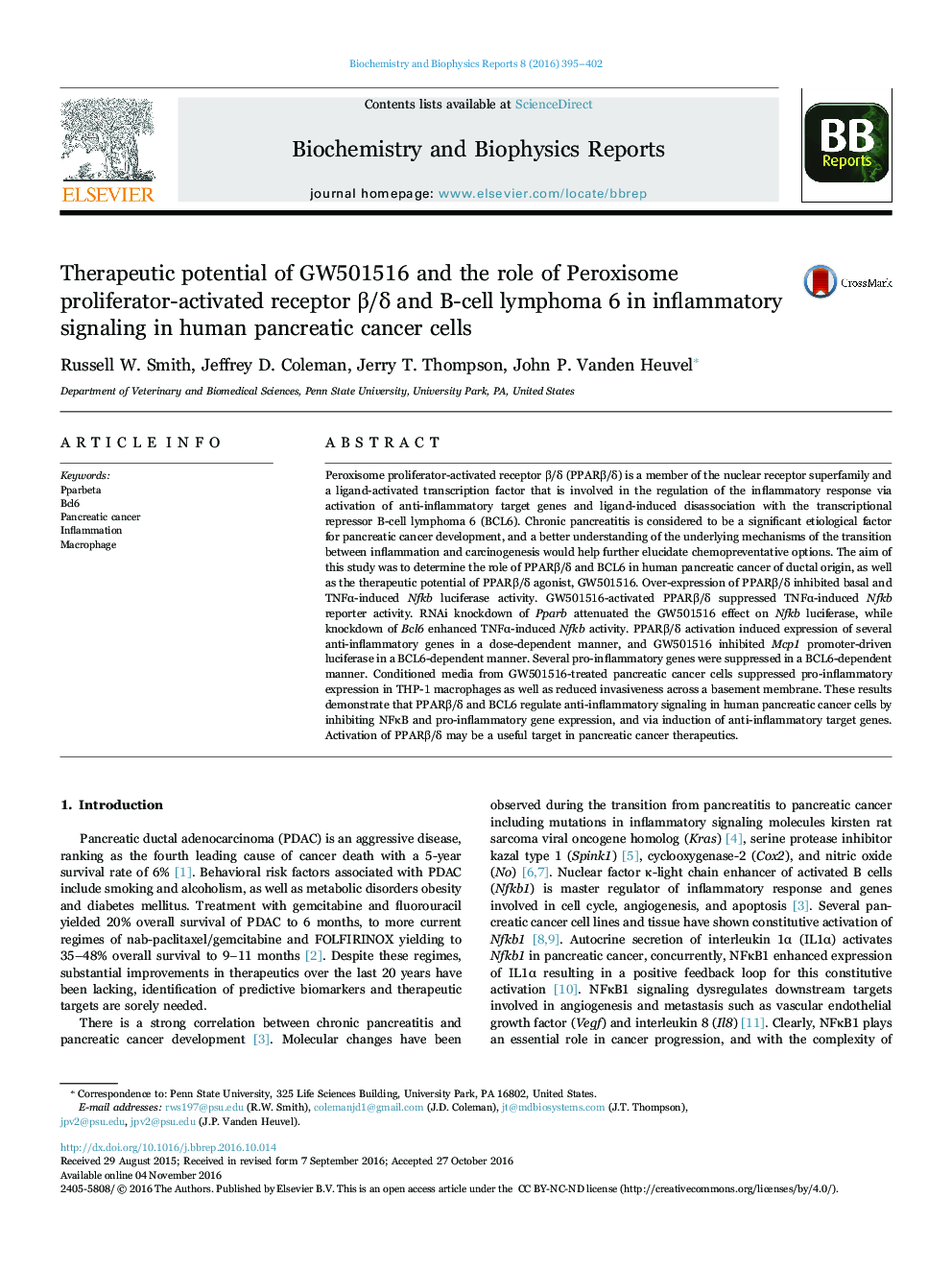| کد مقاله | کد نشریه | سال انتشار | مقاله انگلیسی | نسخه تمام متن |
|---|---|---|---|---|
| 8298513 | 1536900 | 2016 | 8 صفحه PDF | دانلود رایگان |
عنوان انگلیسی مقاله ISI
Therapeutic potential of GW501516 and the role of Peroxisome proliferator-activated receptor β/δ and B-cell lymphoma 6 in inflammatory signaling in human pancreatic cancer cells
دانلود مقاله + سفارش ترجمه
دانلود مقاله ISI انگلیسی
رایگان برای ایرانیان
کلمات کلیدی
موضوعات مرتبط
علوم زیستی و بیوفناوری
بیوشیمی، ژنتیک و زیست شناسی مولکولی
زیست شیمی
پیش نمایش صفحه اول مقاله

چکیده انگلیسی
Peroxisome proliferator-activated receptor β/δ (PPARβ/δ) is a member of the nuclear receptor superfamily and a ligand-activated transcription factor that is involved in the regulation of the inflammatory response via activation of anti-inflammatory target genes and ligand-induced disassociation with the transcriptional repressor B-cell lymphoma 6 (BCL6). Chronic pancreatitis is considered to be a significant etiological factor for pancreatic cancer development, and a better understanding of the underlying mechanisms of the transition between inflammation and carcinogenesis would help further elucidate chemopreventative options. The aim of this study was to determine the role of PPARβ/δ and BCL6 in human pancreatic cancer of ductal origin, as well as the therapeutic potential of PPARβ/δ agonist, GW501516. Over-expression of PPARβ/δ inhibited basal and TNFα-induced Nfkb luciferase activity. GW501516-activated PPARβ/δ suppressed TNFα-induced Nfkb reporter activity. RNAi knockdown of Pparb attenuated the GW501516 effect on Nfkb luciferase, while knockdown of Bcl6 enhanced TNFα-induced Nfkb activity. PPARβ/δ activation induced expression of several anti-inflammatory genes in a dose-dependent manner, and GW501516 inhibited Mcp1 promoter-driven luciferase in a BCL6-dependent manner. Several pro-inflammatory genes were suppressed in a BCL6-dependent manner. Conditioned media from GW501516-treated pancreatic cancer cells suppressed pro-inflammatory expression in THP-1 macrophages as well as reduced invasiveness across a basement membrane. These results demonstrate that PPARβ/δ and BCL6 regulate anti-inflammatory signaling in human pancreatic cancer cells by inhibiting NFκB and pro-inflammatory gene expression, and via induction of anti-inflammatory target genes. Activation of PPARβ/δ may be a useful target in pancreatic cancer therapeutics.
ناشر
Database: Elsevier - ScienceDirect (ساینس دایرکت)
Journal: Biochemistry and Biophysics Reports - Volume 8, December 2016, Pages 395-402
Journal: Biochemistry and Biophysics Reports - Volume 8, December 2016, Pages 395-402
نویسندگان
Russell W. Smith, Jeffrey D. Coleman, Jerry T. Thompson, John P. Vanden Heuvel,